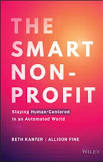- Home
- About Us
- The Team / Contact Us
- Books and Resources
- Privacy Policy
- Nonprofit Employer of Choice Award

 For nonprofit leaders looking to understand artificial intelligence (AI), The Smart Non-Profit: Staying Human-Centered in an Automated World is a thought-provoking and essential read.
For nonprofit leaders looking to understand artificial intelligence (AI), The Smart Non-Profit: Staying Human-Centered in an Automated World is a thought-provoking and essential read.
This isn't a technical how-to guide; instead, it's a strategic roadmap that focuses on the practical and ethical applications of AI. Filled with real-world examples, this easy-to-read book provides a clear framework for integrating AI with a human-first mindset, prompting you to explore the critical questions of how and why your non-profit could use automation, and what to consider before you start.
The authors, Beth Kanter and Allison Fine, begin by defining "smart tech" as "advanced digital technologies that make decisions for people, instead of people.” This covers everything from machine learning and chatbots to the familiar algorithms used by Netflix and Facebook. They are quick to present a balanced view, exploring both the virtues and the risks of using smart tech, with a consistent focus on ethical, human-centred, implementation.
The biggest challenge, particularly for small nonprofits, is that the most powerful AI automations are driven by large amounts of clean data. If your organization doesn't have that, some of the case studies might not feel immediately relevant. You could skip those chapters, but I think you’d be captivated by the possibilities regardless. I assure you, there’s still plenty of insightful content that will feel applicable no matter the size of your nonprofit.
Part II of the book is the most interesting, offering compelling examples of AI in program delivery, back-office operations, and fundraising. Spoiler alert: I’m not going to go through each chapter but want to drill down on the sections dealing with fundraising and philanthropy.
No more “spray and pray” appeals
The authors tackle the "leaky bucket" of donor acquisition and retention, arguing that it pushes us into transactional fundraising instead of building deeper relationships. They aren't wrong, and more importantly, they offer a solution: using smart tech to enhance relational fundraising. AI can help you give large numbers of donors a personalized experience that is usually reserved only for major supporters.
For example, the book shows how donor prediction models can help identify which donors to contact, while other AI tools can research potential donors in minutes, saving valuable time. If you have the data, smart tech can pinpoint who is most likely to give, who might lapse, and who could upgrade their giving. The authors cite one of my favourite charities, Charity Water, and its use of the Persado platform to hone its Facebook content and grow its monthly giving program. Smart tech can also analyze the peer groups of your existing donors to attract more of the people you want to reach. No more "spray and pray" appeals for donor acquisitions.
Kanter and Fine suggest that the future of giving is the ability to target donors and their friends with such personalized messages that you could (in theory) achieve a 100% ROI. I have to admit, I’m skeptical of a perfect ROI, but I believe deeply in the concept they're proposing. The core idea is to use AI to free up your team's time, allowing them to do what they do best: develop better relationships with your clients and donors. The data may still be a challenge for some smaller nonprofits, but it’s not an insurmountable one.
A human-centred focus
The central theme is to remain human-centred. This means starting any smart tech implementation with input from your key stakeholders and being committed to a cycle of testing, reflection, and improvement. It also demands a non-negotiable commitment to ethical data stewardship—mitigating bias and protecting privacy. They end section III with a call for the public not to be passive consumers and insist that smart tech companies be regulated and monitored to mitigate bias and unethical uses of this technology.
Ultimately, the goal of this book is to give you strategies (and inspiration) to implement AI in a way that creates a better workload for your staff that alleviates the burnout that so often characterizes our sector. What I appreciate most about this book is the authors' optimism and their conviction that through the ethical use of AI, we can build a better workplace, create more efficient processes and build better relationships in the nonprofit sector.
The Smart Nonprofit is available for purchase here.
Michelle Harder has over 20 years of experience in fundraising and nonprofit development both as a consultant and as part of an executive team. With a Master of Arts degree in Philanthropy & Development from Saint Mary’s University in Minnesota, Michelle has both theoretical and practical experience in fundraising. As an author, consultant and public speaker, with a specialty in small shop and faith-based fundraising, Michelle is driven by a passion to help organizations achieve their fundraising and strategic goals.